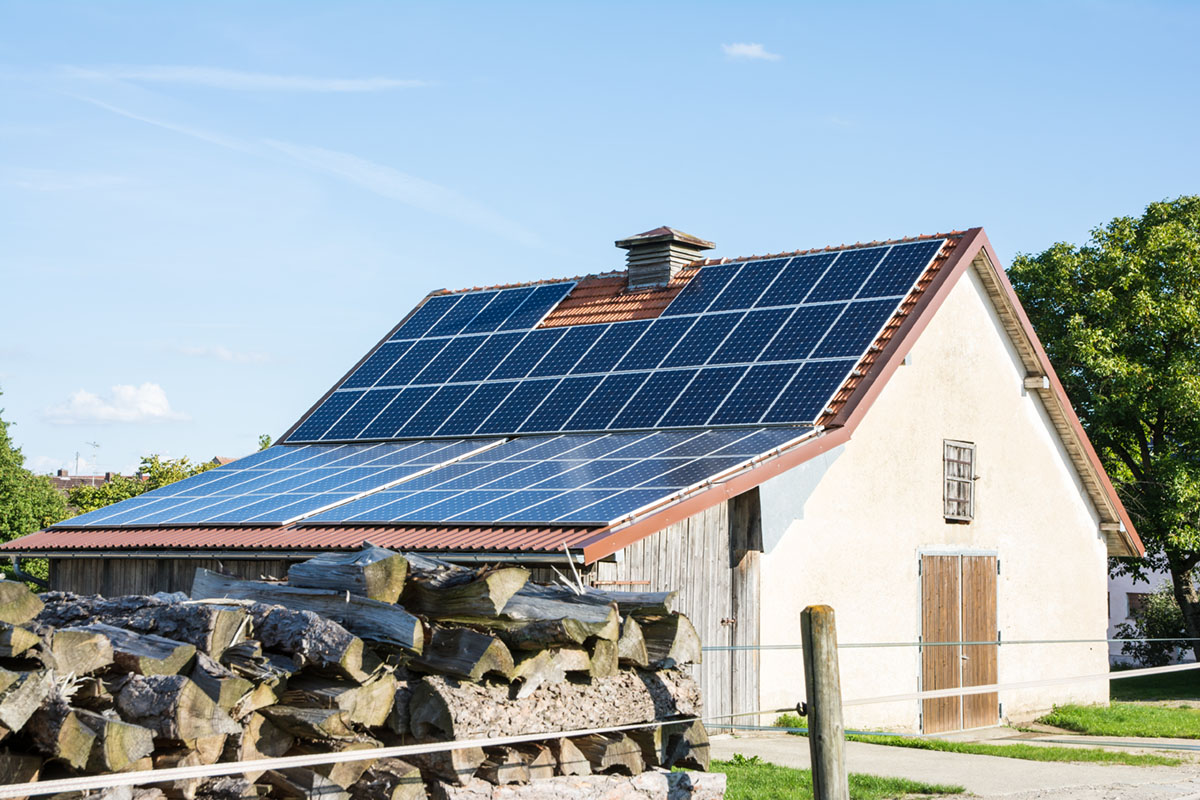Since first becoming popular in the 2000s, solar panels have been a lead renewable energy source for the modern American home.
The Department of Energy’s Solar Energy Technologies Office (SETO) has contributed to this meteoric rise by making solar power more affordable every year.
Perhaps you’ve thought about making the switch, or you’re ready to launch your project.
Let’s check out your handy checklist to help you select your solar installation team!
1. Know What You Are Doing
Before you hire a team to install your solar panels, it’s helpful to know what you’re getting by investing in solar energy.
When it comes to residential use, you’ll be getting solar technology called photovoltaics (PV).
PVs are the panels you see in fields and backyards or rooftops.
As the sun shines, cells in the panels trap the photons in sunlight.
An electronic field is generated between these layers, and the resulting electricity helps power your home.
Though solar panels have a robust design and are used in multiple climates, it’s essential to know whether your location and home are suitable.
Knowing what you’re doing and the situation you need prevents you from being taken advantage of by a smooth-talking sales rep.
Solar panels have the potential to significantly reduce your energy expenses, but only when the panels are installed in the right location and receive adequate sunlight.
Ideally, a solar panel achieves the most potential when placed on a south-facing roof with a slope between 15 to 40 degrees.
2. Know Your Limitations
If you’re looking to save money on your system costs, don’t exclude the option of hiring a solar system installer.
You want your system connected to the grid and running correctly.
And you benefit from high-quality materials that come with a warranty.
Professionals give you the best of both worlds.
Materials and panels sourced from a professional rather than a generic DIY kit increase your system’s lifespan.
Should you experience problems from the installation process, a professional company will honor their work and make any needed repairs.
You also get expert insight into any permits or licenses needed for the installation.
3. Know What to Expect
Cost savings is a significant motivation for homeowners looking to go solar.
But the upfront expense should receive equal attention.
Before you determine which installer to use, have a reasonable expectation for the expense and resulting return on investment.
The National Renewable Energy Laboratory has created a tool to help estimate the cost savings solar panels may provide.
The PVWatts calculator gives you a starting point for talking with an installer.
You can get a customized quote once you determine the solar system to install, but this calculator sets reasonable expectations for savings.
Several factors impact your bottom line:
- System size
- Owning vs. leasing a system
- The amount of electricity your property uses
- Panel location and amount of sunlight
- Electricity rates and any supplemental compensation of the utility provider
4. Know the Plans for Your Project
Factors that determine how much money you can save with solar also impact your solar quotes.
Having a project plan makes it easier for installers to provide you an accurate estimate of what the installation should cost:
- Choose where the panels should be placed: On or off the grid
- Determine how much power you need
Don’t rush into an install without having worked out these details.
At the very least, make a list of these questions to ask potential installers.
5. Know Where to Look for Solar System Installers
If you know people who’ve had a solar system installed, ask for their contractor recommendations.
An internet search will turn up dozens of options, but it’s best to work with a team that comes recommended.
Online reviews give you an idea of what to expect, but a personal reference is usually more thorough and verifiable.
SETO has done some of the homework for you for a reputable option when it comes to both potential providers and assessing whether your home is a good candidate for solar.
SETO has partnered with awardees to provide mapping services on solar panel potential and pre-screened solar provider installation offers.
But this doesn’t mean the government recommends or guarantees these providers’ services.
SETO is committed to awareness and education, leaving the decision up to you as a homeowner.
Start with installers with memberships to the Solar Energy Industries Association.
6. Know How to Check Your Installer’s References
In addition to asking for quotes from solar system installers, you should also check their references.
Some states require solar contractors to hold a license, which is the first check to make.
Even if you’re working with a personal recommendation, ensure the installer meets your state’s requirements.
If your state doesn’t have a licensing requirement, check for North American Board of Certified Energy Practitioners certification.
Look for installers who carry liability insurance to cover their services and protect you and your property during the installation.
Also, request several personal and professional references from a potential solar contractor and follow up with these individuals.
Be specific when asking questions.
Look for:
- Timeliness
- Professionalism
- Communication
- Problems during or after the installation
7. Know What to Ask Solar System Installers
When you have narrowed down your options, you may ask more pointed questions to decide.
The world of solar may be entirely new for you.
Yet, it’s well within your right and responsibility to ensure you have the answers you need before moving forward.
Consider these questions.
Who Will Secure the Permits?
Pulling installation permits can be confusing.
But working with a professional installer can help expedite the process.
You should ask if your quote includes permit processing and precisely how much of the total cost is allocated for permitting.
Who Will Prepare the Paperwork and Documentation?
The paperwork for a permit or installation or to connect with the local utility company can be time-consuming and complex.
It’s essential to get the details and information right to avoid delays in your project.
You may also not know where to find the necessary paperwork.
Working with a contractor can make this process more efficient.
Who Will Be the Point Person for the Utility Company?
Though solar system installers know what they’re doing, there are different rules for connecting to the grid.
It’ll go more smoothly if your contractor has a connection with the local utility company.
But if not, someone from the installation team must be the point person for the utility company.
This way, there’s no confusion or error about what’s allowable and what to expect down the road.
Who Will Be Doing the Installation Work?
It’s important to know if the contractor you hire will be doing the installation work or subcontractors.
With subcontractors, you cannot check on the quality of work or if the installation team has had training or adequate experience.
We recommend asking follow-up questions about:
- Warranties
- Workmanship
- Insurance
- And more
8. Know How to Work Out the Details
Once you’ve short-listed solar installers, you must work out the final contract and payment details.
You should never work without a contract and never sign a contract without first going over all the details.
Be sure to identify the initial down payment through payment installments if you’re financing your system.
There should be firm stipulations regarding the work completed before final payment.
Your contract should outline a deliverables timeline.
This includes a start date and completion date, with specific instructions or adjustments if the contractor misses milestones and deadlines.
Moreover, the contract should give you a clear understanding of what the contractor’s policies are concerning:
- Cancellations
- Warranty
- Additional material costs
A contract doesn’t just protect the installation team.
It protects your interests as well.
Make sure your contract includes the installer’s business license number and contact information before you sign.
Don’t be afraid to ask questions.
9. Know How to Follow Contractor Progress
Once your solar system installer gets to work, you need to stay involved with the project.
Though you may have asked plenty of questions to identify the right installer, keep asking questions as the project progresses:
- Some initial work may be obtaining needed permits, but don’t wait long before confirming the permits are approved.
- Trust your installer’s advice on materials but ask about efficiency and durability.
- Ask about different options and do your research on inverters.
- If you’re purchasing all the materials and your contractor is just installing them, be sure to store receipts and any accompanying warranty information in a folder.
- If the contractor is making the purchases, ask for all receipts.
- Keep a list of hours when workmen are onsite. This is important if you’re paying hourly labor costs and not a flat fee.
- Take photos of the materials being used and note any damaged products.
- Keep a photographic log of progress and take detailed notes of what goes on each day. This is valuable legal information if your contractor falls behind schedule and you have contract issues.
10. Know that You Are the Boss
You have hired a team of solar system installers, a move that essentially makes you the boss of your project.
You have every right to speak up when something is out of place or you have an issue with the way things are being done.
If the installer doesn’t honor the terms of the contract or parts of the project are abandoned, you can withhold payment.
Try to resolve the issue with your project manager or company owner, but don’t hesitate to reach out to your local consumer affairs office about the challenges you’re having.
Do a thorough inspection when the solar panels are installed.
The final results should be what you had agreed to.
See how the panels power your home and make sure everything is in working order.
Once you’re satisfied, you can pay your solar system installer and leave a positive review on their website.
Professionals for Your Job
For solar panel equipment and an installation that you can trust, turn to Unbound Solar®.
We don’t have a one-size-fits-all plan for your needs.
We create custom solutions and give you tips on hiring a solar installer team to keep your project on track.
Give us a call today!




